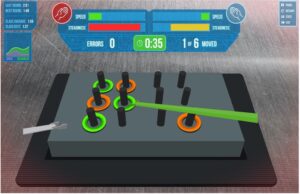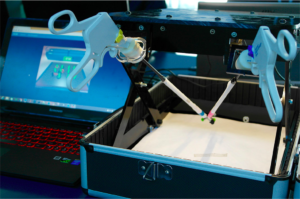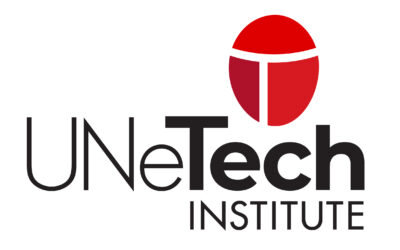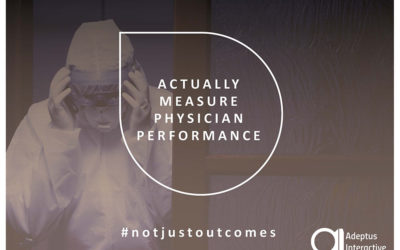What if the best way to improve healthcare is to improve the caregivers? Medical education, despite the advances in technology, often resembles education from 30, 40, or even 50 years ago. Just like a generation ago, medical students spend years in lecture. Technology offers another option; simulation brings the clinic into the classroom.
Being a medical professional is enormously difficult and the experts that teach tomorrow’s nurses, doctors, and other providers are tireless. They deserve the most innovative tools that are available.

The simulated image of the Adept training game
A collaborative team from the University of Nebraska Medical Center, University of Nebraska Omaha and the University of Nebraska Lincoln, working closely under the Omaha Medical Technology Pipeline, is using innovation to improve medical training. They’ve picked an unforgiving place to start.
Surgeons must gain expert knowledge of anatomy, precision motion, and efficient use of their time. Laparoscopic surgeons need to learn all the same things while seeing only their tools on a flat TV screen.
Fundamental skills, like knowing the location of each tool relative to each other, are completely different in laparoscopy. Trainees must learn a whole set of skills—and then use them to do surgery. “Learning laparoscopic surgical skills is not easy,” said Dr. Siu, one of the inventors of the Adept, a new invention in UNeTech’s incubator. “Great coordination between vision and hand motion is a must. It requires unique training platform and environment to master laparoscopic surgical skills. Adept is the solution for such training.”
Using a custom-built trainer that utilizes computer vision to capture the surgeon’s every move, the team translates the surgeon’s movement of real surgical tools and translates that motion to 3-D game technology. In the game environment, the simulation can change colors, provide surprise challenges and otherwise turn simulation into a game.

An early prototype of the Adept
Working closely with the University of Nebraska Office of Continuing Education, the team is poised to offer a unique service for practicing surgeons – at home simulation to maintain their continuing medical education credits. “The goal of Adept is to allow trainees to acquire fundamental surgical skills whenever and wherever they prefer,” Siu said. Working with practicing surgeons, the team will collect data from their simulation runs.That data will help inform the development of an artificial intelligence (AI) integration that can look at a variety of factors that show skill mastery.
That artificial intelligence is the key to making healthcare better. More than the ability to assess if a doctor is doing a good job, better training simply makes every doctor better at what they do. “I truly believe that AI is one of the future keys to transform healthcare delivery and medical training,” said Siu. “The emerging challenge in disease diversity and patient complexity, AI would increase the efficiency and enhance the healthcare effectiveness. For medical training, AI helps to personalize our training program and tailor individual needs for skills acquisition. We believe Adept with AI will accelerate human learning experience and maximize human performance.”
Breaking something as complicated as laparoscopic surgery down to moment-by-moment motions creates new dimensions of data to analyze. In that data—the actual motions made by the surgeon as they practice their vocation—is all the data needed to show them how to do their job better: improving healthcare one professional at a time.



